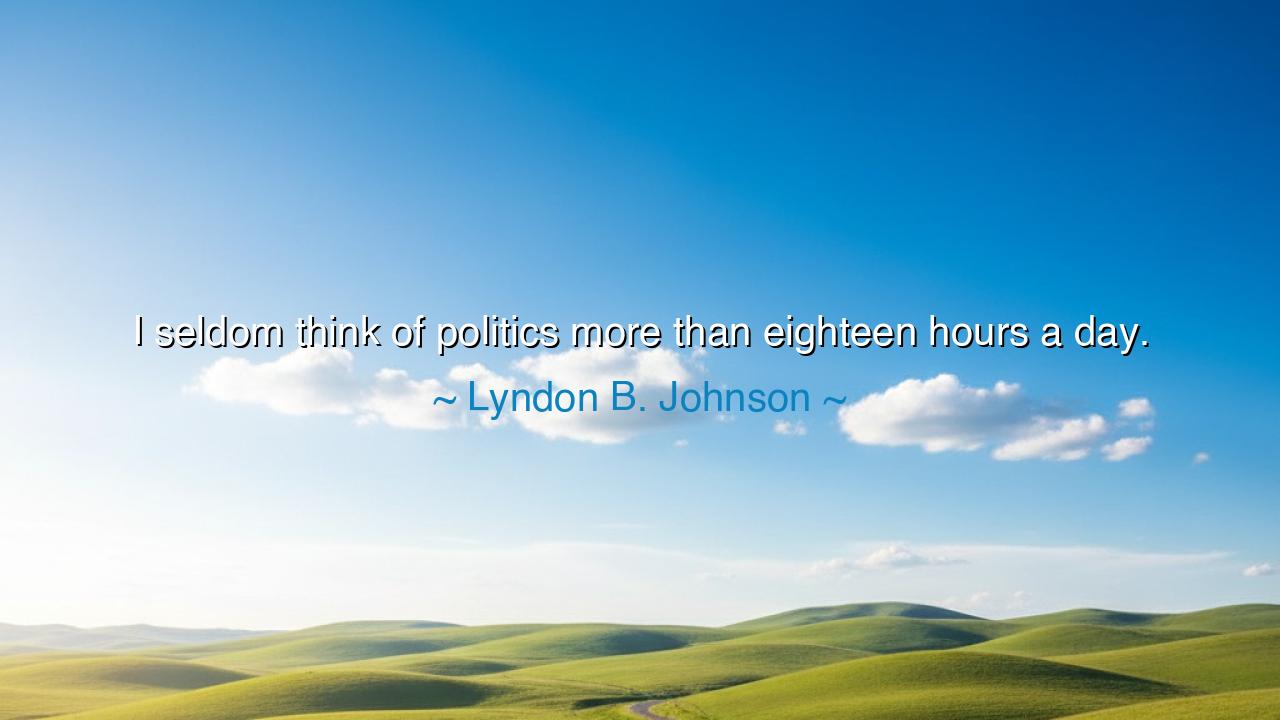
I seldom think of politics more than eighteen hours a day.






The words of Lyndon B. Johnson — “I seldom think of politics more than eighteen hours a day” — are a jest wrapped in truth, a confession of the consuming fire that is public life. With humor he lightens the burden, yet behind the laughter lies the shadow of endless toil. For politics is no pastime; it is a storm that swallows the hours, leaving little for rest, family, or peace of mind. Johnson’s words teach that those who bear the mantle of leadership are rarely free from its weight.
In this saying is revealed both dedication and irony. To think of politics “only” eighteen hours is to declare that the heart and mind never truly escape its grasp. Such was the life of Johnson, a man forged in the crucible of American struggle — from civil rights to war, from poverty’s blight to the moon’s promise. His jest reminds us that true leaders do not sleep easily, for the cries of the people echo in their thoughts long after the sun has set.
History shows us the cost of such ceaseless labor. Consider Winston Churchill, who during the Second World War scarcely rested, pouring his very life into speeches, strategies, and decisions that shaped nations. His body grew weary, but his spirit endured, for he, like Johnson, understood that to hold the helm in times of storm is to surrender one’s own ease. Thus Johnson’s words are not merely humor but an admission that public duty devours the self.
Yet this devotion, though heavy, is also noble. Johnson’s “eighteen hours” symbolize the sacrifice required to bend the arc of history. Without such consuming focus, the Civil Rights Act might have faltered, and millions would have remained bound by injustice. Through endless hours of persuasion, pressure, and perseverance, Johnson showed that politics, though wearying, can be a tool for liberation.
Let the generations to come take heed: power is not ease, and leadership is not leisure. To serve the people is to yield the comforts of rest, to think beyond the measure of ordinary days. Johnson’s jest is thus a lesson — that those who would guide nations must prepare to be consumed, as the candle burns itself away to bring light to others.






MTVu Minh Tuan
Johnson’s lighthearted remark about thinking of politics 18 hours a day makes me wonder how it affects a leader's ability to make clear decisions. If politics occupies that much mental space, how does it affect objectivity? Can anyone stay unbiased or rational when they’re so immersed in the political world? Does this kind of focus help leaders, or does it create tunnel vision?
HHhai ha
This quote speaks volumes about the intense pressures of being in politics. Eighteen hours a day is a staggering amount of time, but it also makes me think: is Johnson exaggerating for effect, or is that the reality of governing? What do you think—do political leaders often lose their sense of self due to the sheer demands of their roles, or is this level of dedication necessary for success in politics?
TBTri Bui
I love how Johnson’s quote reflects the weight of the political world. It seems like he's suggesting that for leaders, politics is all-encompassing—more than just a job, it’s a way of life. But what happens to personal well-being in this kind of environment? Can someone remain grounded and healthy when politics takes up nearly every waking hour? Is it even sustainable to live like that for long periods?
NQNhu Quynh
Johnson’s quote is both humorous and telling. The fact that he says he only thinks about politics for 18 hours a day speaks to how consuming political life can be, especially for someone in such a high position. But it also raises the question: how does one maintain balance when politics dominates so much of their time? Can someone truly be effective in politics without it overwhelming every aspect of their life?